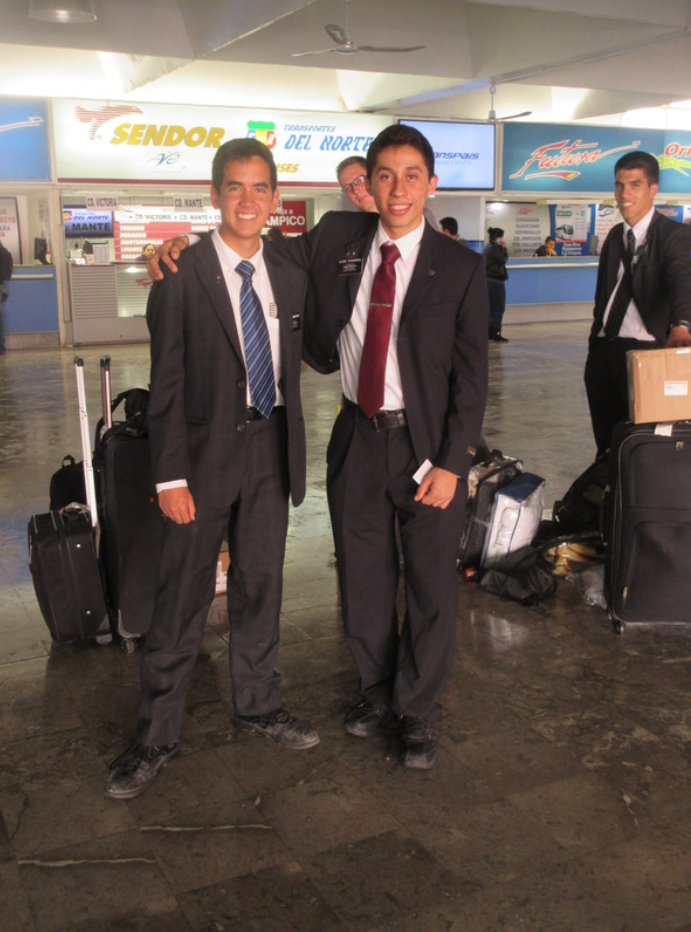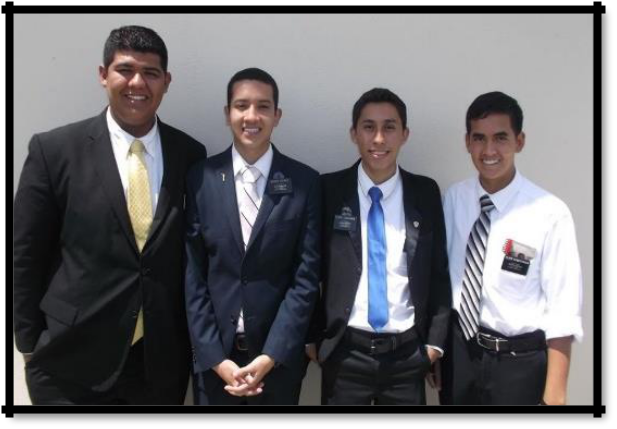56. Trainee to Trainer
- L Rshaw

- Nov 11, 2019
- 6 min read
Updated: Nov 13, 2022
"Today a reader. Tomorrow a leader."
--- Anonymous
Becoming a full-time missionary of the Church of Jesus Christ of Latter-Day Saints is a bit like learning how to float on your back in the first swimming lesson and then going deep-sea diving in the second lesson. Missionaries are teachers, but they're still students in a manner of speaking too. No one is born into this world a master of anything. That only comes by study and practice. Thankfully, even though you have to learn to swim quickly, immersion is the fastest way to learn. The task can seem daunting at first, but your swim instructor is always right there in the water with you to keep you from drowning. The thing about being a missionary is this: whether literally, or otherwise, you are never alone.
Click to Navigate (Table of Contents):
TRAINING
We got news about transfers on Monday, March 2, 2015. Elder Rangel was leaving us the next day to go to another part of the city (Matamoros 1), who at the time was Elder Urias’ companion, but then something odd happened. Elder Lopez, that’s right, my companion Elder Lopez was assigned to Elder Urias.
Then they told me that I was going to be training! (See "Testimonies and Trainers"). I was in denial at first. I’d never been signed off for my own training because the first Elder Lopez whom I was with hadn’t sufficiently prepared me for my evaluation with Elder Green (See "Intercambios"). It was my understanding that the successful completion of the twelve-week training program was requisite to be a trainer but I guess in this instance, I was an exception (See "Mission Administration"). As I went throughout my mission, there were many instances where President Morales placed trust in me and I didn’t always recognize it but each experience was an opportunity to grow by doing hard things. It’s often said that you can’t grow by staying in your comfort zone. This was one of those experiences. I was nervous! The older I get, the more I realize that most of life's education is self-taught.
It's my understanding that trainers never know who they'll be training until they're there in the same room and it's announced to both of you (See "Testimonies and Trainers"). Firstly, I was nervous that I might have to train an American who didn’t know Spanish because I still felt less than par when it came to the language (although I probably didn’t give myself enough credit). Still, I went forward with faith that whomever I was assigned would be by inspiration from my Mission President and with his trust placed in me and my capacity to train.
Rest assured, there were many fervent prayers during that time; each ended with, “Nevertheless, not my will but thine be done”.


My anxiety was washed away with giddy anticipation, like a first-time father counting down the hours until I met him the next day on Tuesday, March 3, 2015. That day was a big one. There were a whopping 17 new missionaries and trainers to match. And there he was, Companion #7, Elder Chavarria (Chah-vah-rree-ah), fresh off the plane from Tabasco, Mexico, and conveniently fluent in Spanish. I would say that he was like most new missionaries; excited but naive, full of faith yet a bit nervous about the adjustment. I was expected to take twice the lead now, showing him the area, while all the while trying to show him the ropes of how to plan, find, teach, and be a missionary.
I was adequate with the language but I felt that many strangers still struggled to understand me. For example; I struggled to say the all-important word for baptism “Bautismo” (Bah-oh-tees-moh). Apparently, the obvious enunciation of the letter “U” was my weakness (as Elder Lopez was kind enough to tell me when I asked him for advice); it sounded like I was saying “Bah-tees-moh”. I sat down with him in the dark of the night under a tree and practiced saying it over and over. To my ears, I was saying the exact same thing he was but he said otherwise. Nonetheless, he told me that I wasn’t wrong and that it was just my accent and nothing to be concerned about. Thankfully, with dedication and practice on my part, I mastered “bautismo” shortly after by slowing my speech down. My real handicap was fear.
I probably leaned on Elder Chavarria excessively. I imagined it would be easier for a missionary to get rolling without taking time to learn a second language like myself but I was mistaken. I had underestimated the language of the spirit and jumped to the conclusion that he knew how to talk to strangers and so forth. Elder Chavarria needed help. Anyone would at the start of the mission. He was an introvert like me. Just because you can speak a language doesn't mean you know how to talk.
TRANSLATOR
At the orientation meeting we had with President Morales minutes after getting our trainees, Elder Baker was serving as his English translator for the new Gringos (Americans). About halfway through, it became evident that for about every twenty-five words President said, Elder Baker said about five. He communicated the gist of what President Morales was saying --- the sentiment --- but not in the way it would sound if we heard the same sentence in English. It's like if I were to say, "I'm exhausted because last Tuesday I had to shovel the snow off the driveway and then I didn't get to bed until midnight" and then someone translated it to mean, "He's tired because he had a hard day and didn't get a lot of sleep". It reminds me of a really old movie, the Court Jester, starring Danny Kaye. When asked a question, his partner takes a really long time to "sign" a response to which Danny Kaye "translates", "She says no". When asked what took her so long (signed so much to convey so little), he responds, "stutters".
President caught on, paused a bit, glanced at Elder Baker, and half-joked if he needed a new translator. Then he looked at me in the front row dead and center and said, “Elder Robertshaw, can you be my translator?” I was stunned but stoked to be his translator! Finally! This was a time for me to demonstrate that I'd been practicing hard to learn Spanish since he seemed so keen on asking me for updates on my progress all the time. Lucky for me, I understood 95% of what he said and gave an English translation with relative ease. I don’t know that I’d felt so proud of my potential until that moment. A few months earlier, I knew hardly any Spanish, and now after much effort and patience, I could see the fruits of the seeds I planted even if they weren't perfect yet.
I think President Morales saw things in us missionaries that sometimes we couldn’t see in ourselves. I had been so hard on myself because my Spanish wasn’t perfect. I’d confided in one of the APs (Assistants to the President), Elder Taylor back in Monterreal, Rio Bravo months earlier on Thursday, December 18, 2014, expressing my frustration at not being able to say everything I wanted in Spanish (See "1st Area: Monterreal, Rio Bravo" and "Mission Administration"). I remember him comforting me and reminding me that all missionaries go through the same thing but that it wouldn’t last forever. He testified how President Morales could sense things in people the minute they met them and how he considered me one of the humblest missionaries in the mission. I certainly tried to be. He told me of the importance of discovering our spiritual gifts and how everything has a reason. I recognized my inabilities and tried to be my best and I learned to not complain but to move forward. I did my best to not let my sense of inadequacy be the only reason for humility. If inadequacy was all it was, it wouldn't have been anything worth praising, certainly. I've learned that humility is a Christ-like attribute that endures even when we prosper, not only when we're struggling.

Being a translator was a vote of confidence, not as much as proof to President but proof to myself that I was more capable than I took myself to be. Perhaps that's why he did it. I had worked hard, and I had come a long way and that was not to be forgotten or unappreciated. By the time I was ten months into the mission, I was practically fluent; able to understand 99% of everything, and apt at conversational Spanish. Once I mastered the gist of grammar, all I had to do was accumulate vocabulary and work on the accent. My Spanish improved a lot but language isn’t everything.
Words don’t convert people. Permanent conversion to the gospel comes from a change of heart (See "Sí, Dios Quiere"). It's a fingerprint of character. Thoughts change like songs on the radio. Always flowing. They come and go in the long hours of the day and in the restful slumber of the night. Feelings however can stay with us forever.




Comments